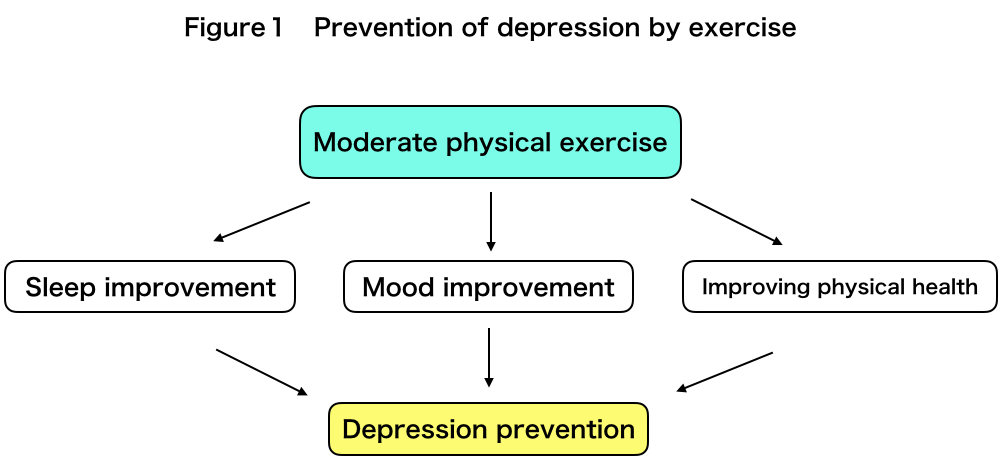Have you been exercising recently?
Did you know that exercise is one of the most effective forms of natural stress relief?
We all know that exercise is good for high blood pressure and obesity, but not many people are aware that it also has a therapeutic effect on depression as a stress-reliever. Research at the American College of Sports Medicine in 2011 drew attention for demonstrating exercise therapy as an effective treatment for depression that doesn’t relying on medication.
Let’s find out what kind of effects exercise has on our mental well-being.
Contents
Exercise in the Evening for Better Sleep
A study of 99 patients with depression in the United States showed improvement in their depressive state after they had done an hour of exercise, aerobic or anaerobic, 3 times a week in a duration of 8 weeks. Although transient (one day only) exercise did not have much effect on stress relief, people with regular exercise habits had a lot of deep sleep, so-called non-REM sleep.
How and when we do our exercises matters for good sleep. In general, sleepiness occurs strongly when our body temperature begins to drop. Elevated body temperatures gradually fall for a few hours after exercising, and the amount of melatonin, a hormone that controls the sleep cycle, increases at night. The synergistic effects of physical activity and our biological rhythm makes it easier to sleep when we exercise in the evenings. In other words, exercise later in the day can act as an effective stress-reliever. However, experts do not recommend exercising right before bed, as it can cause physical stress. Excessive exercise is also counterproductive because the sympathetic nerve becomes stimulated and excited. As for the appropriate kind of exercise, experts recommend jogging and fast walking for moderate exercise that is effective for stress relief. Soaking in a lukewarm bath is also adequate.
Sleep Deprivation Leads to Mental Crisis?

There seems to be a very strong relationship between sleep deprivation and depressive symptoms. In Finland, a survey of 40,791 non-depressive individuals found that those who experience insomnia more than five nights a week were more likely to develop depression. Experts generally recommend adults to sleep about 7 hours a day. Shorter or longer sleep tends to result in higher mortality rates over the course of 6 years. Chronic sleep deprivation can interfere with our daily well-being through symptoms of constant fatigue, lack of focus, and increased irritation. It’s very important to encourage healthy sleeping habits and moderate exercise for stress relief.
Fun Exercise Improves Brain Function

According to recent research, excessive stress causes thinning of the hippocampus, a part of the brain which can lead to various mental disorders. On the other hand, animal studies have also shown that spontaneous exercise promotes the growth of hippocampal nerve cells while reducing depression, thereby acting as a stress-reliever. Other studies demonstrate that forced activities do not promote hippocampal nerve cell growth as much as willing activities.
17 people answered a survey after they had exercised for 1 hour, once a week. Most people who found the lesson enjoyable had a higher tendency towards improved mental health. Hip-hop dance classes had a particularly high satisfaction rate. Perhaps the participants enjoyed it because they could do their best within a reasonable range by using the basic steps of hip-hop dancing. In order for physical activity to act as an effective stress-reliever, it’s important to exercise with interest rather than being forced to do it.
Incorporate a Little Exercise Into Your Daily Life
Disability-adjusted life years (DALYs) is the summary measure used by the WHO to indicate the overall burden of diseases. Since 2004, unipolar depressive disorder is now the 3rd burden of diseases globally. It’s even projected to become the leading cause of DALYs by 2030. Anyone can develop depression. Working out potentially improves sleep and creates positive change for both our mental and physical well-being. We can say that exercise is an effective means of self-care and stress relief. (Figure 1)

The development of transportation and the internet has made human life more and more convenient. However, as technology develops, we have fewer opportunities to demonstrate our fundamental motor ability. Therefore, it is vital to actively move our bodies. Try some light stretching if you are busy, or try walking a little bit further if you aren’t good at exercise. Regardless of your skill level or intensity of activity, exercise is one of the best natural stress-relievers. The sum of these small efforts will surely help improve your general health in the long term.
→ Looking to improve your mental health? Try the SELFMIND app FREE for 1 week!
If you’re looking for more tips on how to care for your mental health, check out some of our past blog posts!
Image:Unsplash
References:Uchida S., Ganeko M., Shioda K., Takeda N., Umezawa J., Tashiro S., Sato D., Abe T.,(2011).Introduction of Exercise for Depression Prevention in Company Workers Japanese Society of Psychosomatic Medicine, 52, 718-725.
Yoshimoto, Y., Akezaki, Y., Nomura, T., Sato, A. Effects of Therapeutic Exercise Combined with a Behavioral Science Approach for the Treatment of Patients with Mental Disorders.(2009).Japanese Physical Therapy Association, 36(5), 287-294 https://doi.org/10.15063/rigaku.KJ00005654287
Sensui, H., Nagamatsu, T., Ihara, K., Nakagawa, M.(2009).Exercise Therapy for Recovering Psychiatric Patients : A Preliminary Study.Bulletin of the Physical Fitness Research Institute, No.107, 15-22.



